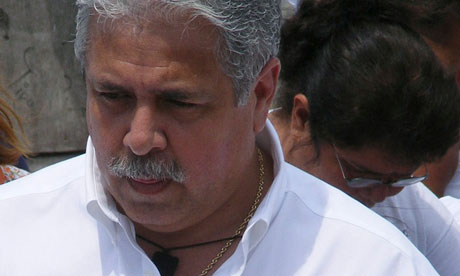
With the game in the balance, and with his country's hopes and dreams about to be dashed at the absolute last second of extra time, Uruguay's Luis Suarez intentionally commited a handball to clear the ball off the goal line.
Suarez was shown a red card and sent off the pitch, but the rest will go down in World Cup lore. Ghana's Asamoah Gyan, the striker whose turn-around blast sent the US packing last week, drilled the crossbar on his attempt to win the game for the Black Stars. The whistle blew. That was literally the last play of the game! Uruguay nets four penalty kicks to send the tearful Ghanians - Africa's last hope - out of the Cup.
Suarez sacrificed himself so his side could go on, but his handball ended an amazing storyline for Africa's first World Cup. In the postgame presser he even said "la mano de Dios la tengo yo ahora."
So my question to you all regarding Suarez' handball: was that cool to do?
A few "professional" opinions:
(As it happened): Really, he might as well stick out his hand. It's a definite goal otherwise. He's saved his team from certain defeat. Horrible cheating, on the other hand. Surely that'll convert the two remaining non-Ghana fans outside Uruguay to get behind the African heroes?
(Post-game recap): They have cheated their way to victory. Within the rules of the game we all love, but cheating all the same.
From the Wall Street Journal (um, what do they know about soccer?):
Uruguay is back in the World Cup semifinals. The little country had to cheat big-time to get there, but that's another matter.
Ghana coach Milovan Rajevac (via The Sun):
"This was sporting injustice but we must congratulate Uruguay. "I don't know what I would tell Suarez at this moment. It was bad luck. That's all I can say."
And Uruguay coach Oscar Tabarez (via The Sun):
"Saying we cheated Ghana is too harsh a word to use. Yes, he stuck his hand out but it's not cheating - I don't think it's fair to say that. The player instinctively reacted and was thrown out of the match and he can't play the next match. What else do you want? Is Suarez also to blame for Ghana missing the penalty?"
Image Source: Wall Street Journal
Online Sources: Wall Street Journal, The Sun, The Guardian, Ovación Digital (Uruguay), Huffington Post, Daily Telegraph




















